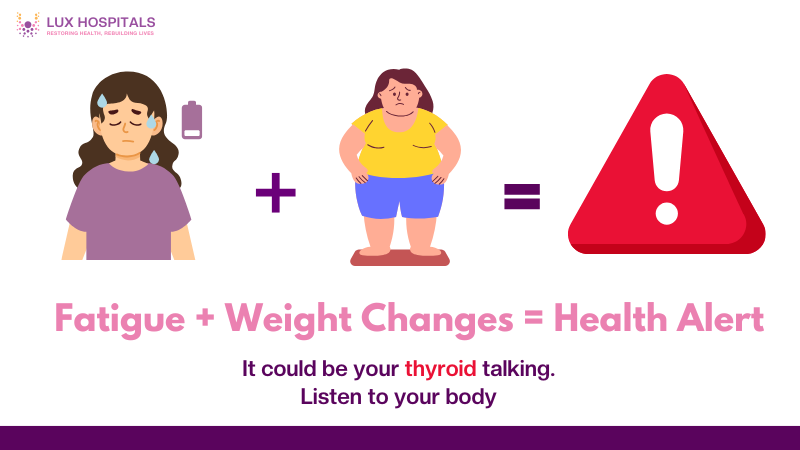Fatigue and Weight loss: Body warnings

Have you noticed sudden changes in your weight and persistent fatigue? Despite their apparent insignificance, these symptoms may be your body’s first warning signs. Ignoring them may cause serious underlying medical concerns to go undiagnosed. You can act quickly if you know what causes fatigue and weight changes. Let’s investigate what your body may be attempting to communicate.
What is fatigue?
Fatigue is more than just being tired. It’s a persistent feeling of exhaustion that doesn’t go away with rest. Unlike normal tiredness, fatigue affects your daily functioning, energy, and mental clarity. It can be physical, cognitive, or both, and it often presents with accompanying symptoms like irritability or insomnia.
What is weight change?
Weight change refers to any increase or decrease in a person’s body weight over time. This can result from changes in diet, physical activity, medical conditions, medications, stress, or lifestyle habits. Weight change may be intentional (such as weight loss from exercise) or unintentional (such as weight gain due to hormonal imbalance or illness).
Common Causes of Fatigue and Weight Changes
1. Thyroid Disorders
An underactive or hyperactive thyroid could bring on fatigue and weight gain or loss. When you have hypothyroidism, your metabolism slows down, resulting in a loss of energy and weight gain. On the other hand, you gain weight and feel less energetic; conversely, hyperthyroidism results in anxious fatigue and weight loss.
2. Diabetes
Your body has trouble using glucose effectively if you have type 1 or type 2 diabetes. Depending on how blood sugar levels are controlled, this can result in fatigue, weight loss, or growth. These symptoms are frequently accompanied by increased thirst and frequent urination.
3. Chronic Stress
Prolonged stress throws off sleep and hormone balance, causing emotional exhaustion and weight swings. The stress hormone cortisol can cause weight gain and cravings for high-calorie foods even when one doesn’t have much energy.
4. Depression
Fatigue and changes in appetite or weight are intimately related to mental health conditions like depression. While some people lose interest in food, others binge and gain weight. Even minor tasks may feel daunting due to the underlying tiredness.
5. Sleep Apnea
Sleep apnea could be why you snore at night and feel daytime fatigue. This condition interrupts your breathing while sleeping, causing poor sleep quality and weight gain. Treating sleep apnea often improves energy and weight stability.
When to Express Concern?
Small weight fluctuations or occasional fatigue are normal, but chronic symptoms require medical care. Seek assistance if your exhaustion persists for over two weeks or you experience significant weight loss or gain. Early diagnosis is crucial for managing possible chronic illnesses.
Diagnosing the Root Cause
Doctors may recommend blood tests, hormone panels, or sleep studies to understand why you are fatigued and are experiencing weight shifts. You might be checked for anemia, thyroid imbalances, or nutrient deficiencies. Finding the underlying problem can assist in repairing your energy and body weight balance.
Managing Fatigue and Weight Changes
1. Balanced Diet
Consuming foods high in fiber, protein, and good fats will help fight weariness. Avoid too much sugar and caffeine, which provide brief energy boosts but long-term falls. A healthy diet supports hormonal and metabolic processes.
2. Regular Exercise
Physical activity boosts energy levels and helps manage weight. Exercise also improves sleep, which directly reduces fatigue. Try to get 30 minutes of moderate exercise five days a week.
3. Sleep Hygiene
Quality sleep is essential in fighting fatigue. Try to get 7 to 9 hours of sleep each night, avoid using gadgets just before bed, and establish a bedtime routine. If you have any sleep issues, get professional advice.
4. Mental Health Support
Counseling or talk therapy might help with the emotional roots of eating habits and exhaustion. You can regain your appetite and energy by managing your depression as well as worry. Never underestimate how crucial mental health is to physical health.
5. Medical Treatment
If a chronic illness is identified, targeted treatment will be needed. For example, thyroid medication or insulin therapy can dramatically reduce fatigue. Ongoing check-ups help maintain energy and weight control.
Prevention Tips
- Stay hydrated to keep energy levels high.
- Manage stress through yoga, meditation, or deep breathing.
- To maintain steady blood sugar levels, eat modest, frequent meals.
- Avoid alcohol and tobacco, which worsen fatigue.
- Listen to your body rest when needed, but don’t become sedentary.
Conclusion
Persistent fatigue and weight changes are not just inconveniences they’re your body’s signal that something isn’t right. Whether due to stress, a sleep disorder, or a chronic illness, these symptoms shouldn’t be ignored. You can regain your vitality and prevent future complications by paying attention and seeking medical advice. Start listening to your body today it knows more than you think.
Frequently Asked Questions
Hormonal imbalances, insomnia, depression, or thyroid problems could be the cause of this. Fatigue is increased, and metabolism is lowered by these situations. For appropriate testing, it is advised that you see a physician.
Yes, stress raises cortisol levels, leading to sleep disturbances and cravings for unhealthy meals. Fatigue and changes in weight are caused by this hormonal shift. These effects can be reversed by reducing stress.
Vitamin B12, iron, and vitamin D deficiency can cause extreme fatigue and unintended weight changes. These vitamins are essential for energy metabolism. Blood tests can confirm deficiencies.
Lifestyle changes like improving sleep, reducing stress, eating nutritious meals, and regular exercise can help. Herbs like ginseng and ashwagandha may also support energy levels. Always discuss natural remedies with your doctor.
In some cases, yes. Chronic fatigue can indicate diabetes, thyroid disease, or even cancer. If it persists beyond two weeks, it’s best to consult a healthcare provider.






















